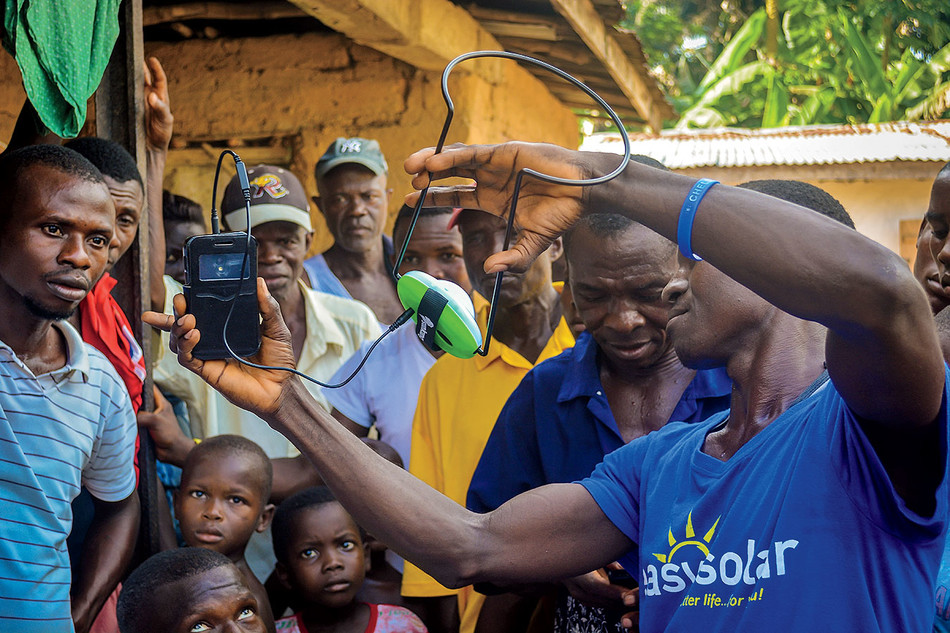Growing up in South Africa, Nthabiseng Mosia ’16SIPA says she spent many nights studying by flashlight, thanks to frequent power outages. But she knew she was lucky to have electricity at all. Even today, less than half of sub-Saharan Africans have access to the grid; in poorer countries, and particularly in rural communities, that number plummets further.
“The statistics are staggering,” Mosia says. “On much of the continent, life stops when the sun goes down.”
Mosia decided to dedicate her career to alleviating the power crisis in Africa. After working in energy consulting for several years across the continent, she enrolled at Columbia’s School of International and Public Affairs. There she met Eric Silverman ’16SIPA, a Peace Corps volunteer who had recently returned from Sierra Leone, and Alexandre Tourre ’16SIPA, who wanted to use his background in finance and technology to tackle problems in the developing world.
Mosia, Silverman, and Tourre teamed up to create Easy Solar, a company that supplies affordable clean-energy products to off-the-grid households in Sierra Leone and Liberia, where over 75 percent of the population is living without power. To ensure that its products are affordable, Easy Solar uses a rent-to-own system, allowing customers to buy “on trust” and make weekly or monthly payments. Their payment histories are recorded and used to create a credit score, which gives customers access to more products and better payment plans.
“The vast majority of our customers don’t have bank accounts or any other form of credit,” Tourre says. “Paying in installments gives them a record of accountability that they can use not only with us but in other areas of their lives.”
Currently, Easy Solar sells a range of solar products for home use. The most basic is a lantern, which charges a mobile phone. Home packages can also include fans, televisions, fuel-efficient stoves, solar water pumps, and rechargeable smartphones. These products make up the bulk of Easy Solar’s business, but in 2019 the company also launched a line of large-scale solar-generators, used to power schools, hospitals, and companies.
In addition to helping customers build a line of credit, Easy Solar’s payment system also helps West Africans buy higher-quality products that ultimately save them money. Mosia says that people in Liberia and Sierra Leone have long relied on cheap, battery-operated flashlights and chargers, because the upfront cost of anything more durable is prohibitively high. But those devices are short-lived, so customers have to keep buying new ones. She says that by using an Easy Solar lantern, which generally lasts at least five years, households can save around $150 over that period — an incredible amount, given that the vast majority of customers live below the international poverty line.
“Solar devices are obviously a more sustainable choice. With our products, we’ve been able to prevent nearly nineteen million batteries from ending up in landfills,” Mosia says. “And with more permanent sources of power, our customers have saved nearly $15 million in total.”
Mosia, Silverman, and Tourre began talking about the idea for Easy Solar as part of a collaborative group project over SIPA’s winter break in 2015. Over the next year and a half, they honed their business plan, conducted extensive surveys, and began to fundraise. Boosted by a win at the 2016 SIPA Dean’s Public Policy Challenge, which came with a $40,000 grant, the trio moved to Sierra Leone’s capital, Freetown, after graduation. There they began their first pilot program with two hundred customers.
Five years later, Easy Solar has provided over 660,000 people across Sierra Leone and Liberia affordable access to clean power. And the social impact does not stop with its customers; Easy Solar has also become a major employer in the two West African countries, creating over nine hundred clean-energy jobs.
“We started out literally fumbling through the dark,” Mosia says. “And we’ve created a network that’s helping thousands of people keep the lights on.”
This article appears in the Winter 2021-22 print edition of Columbia Magazine with the title "Power Brokers."



